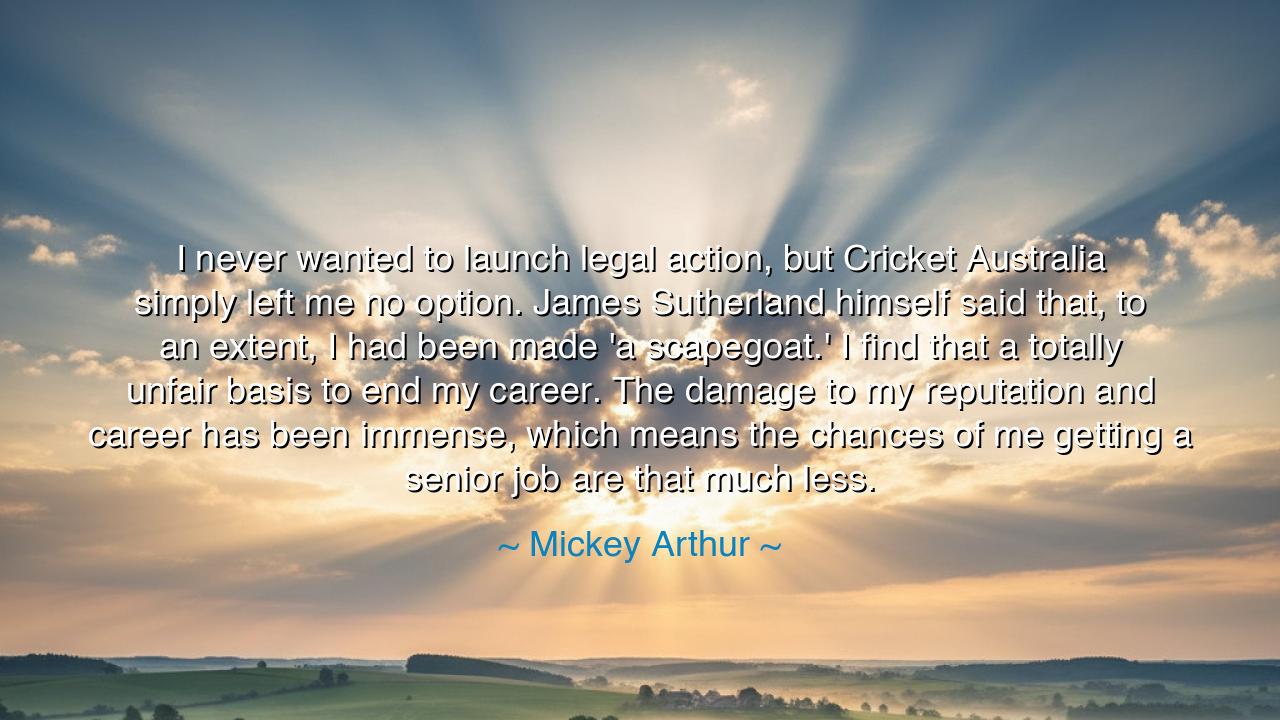
I never wanted to launch legal action, but Cricket Australia
I never wanted to launch legal action, but Cricket Australia simply left me no option. James Sutherland himself said that, to an extent, I had been made 'a scapegoat.' I find that a totally unfair basis to end my career. The damage to my reputation and career has been immense, which means the chances of me getting a senior job are that much less.






"I never wanted to launch legal action, but Cricket Australia simply left me no option. James Sutherland himself said that, to an extent, I had been made 'a scapegoat.' I find that a totally unfair basis to end my career. The damage to my reputation and career has been immense, which means the chances of me getting a senior job are that much less." Thus lamented Mickey Arthur, a coach cast aside in the storm of blame, his voice rising not only as protest but as testimony to a timeless truth: that when institutions falter, they often seek not justice, but scapegoats. His words are not only the cry of a man wronged, but also a warning to generations—that reputations may be sacrificed to shield the powerful, and that fairness, when abandoned, wounds both the individual and the greater cause.
The origin of this wisdom lies in one of the most ancient patterns of human behavior. From the days of tribes and kingdoms, when calamity struck, leaders often sought a scapegoat—an innocent upon whom blame could be laid, so that the community might be appeased. In Arthur’s tale, the stage was not a temple or a throne room, but the arena of international cricket, where the pride of a nation hung heavy. A series of failures demanded accountability, and instead of shared responsibility, one man was chosen to bear the weight. His career was fractured, his name stained, and his voice left to cry out against the injustice.
Consider the story of Socrates, condemned by Athens not for crimes, but for unsettling truths. When the city faltered, its leaders feared unrest, and so they made Socrates the scapegoat, silencing him with death. His trial was not about justice but about sacrifice—choosing one man to bear the fear of the many. In both Athens and in Arthur’s story, we see the same ancient pattern: when power trembles, it seeks a single target, even if the truth is crushed in the process.
Arthur’s words are also deeply human. He declares that he did not seek legal action, for such a course is rarely the desire of any man; it is a path taken when all others are closed. His grief is not only for lost wages or positions, but for reputation—that delicate flame which once extinguished is hard to rekindle. For in the world of leadership, where trust and honor are the currency, to be called a scapegoat is to be marked, to be cast in shadow even when guilt does not belong to you.
The teaching here is both tragic and heroic. Tragic, because it shows how institutions can wound those who once served them faithfully. Heroic, because Arthur’s protest becomes an act of courage: to speak against injustice, to defend one’s name, even when the tide runs strong against you. His lament becomes not merely self-defense but a testament for all who have been made sacrificial lambs, reminding them that silence is not the only path.
The lesson is clear: beware the temptation to assign blame too swiftly, and beware of systems that seek the easy way out by casting down individuals. True leadership does not hide behind scapegoats, but bears responsibility with courage. And for those who suffer unjust blame, let Arthur’s words remind you to guard your integrity, for though reputations may be damaged, truth spoken with courage has a power that outlasts slander.
What practical steps must we take? As individuals, we must resist joining the chorus that condemns without full knowledge. As leaders, we must remember that fairness demands responsibility shared, not thrown upon one. And as a society, we must honor those who dare to defend their names against unjust accusation, seeing in them the reflection of countless others through history who bore blame they did not deserve.
So let Arthur’s cry be remembered not merely as the complaint of one coach, but as a voice echoing an ancient truth: scapegoating destroys justice, damages lives, and weakens the very institutions it seeks to protect. Let the future choose the harder path of fairness over the easy sacrifice of one, and in doing so, build systems where justice, not blame, becomes the foundation of strength.






AAdministratorAdministrator
Welcome, honored guests. Please leave a comment, we will respond soon